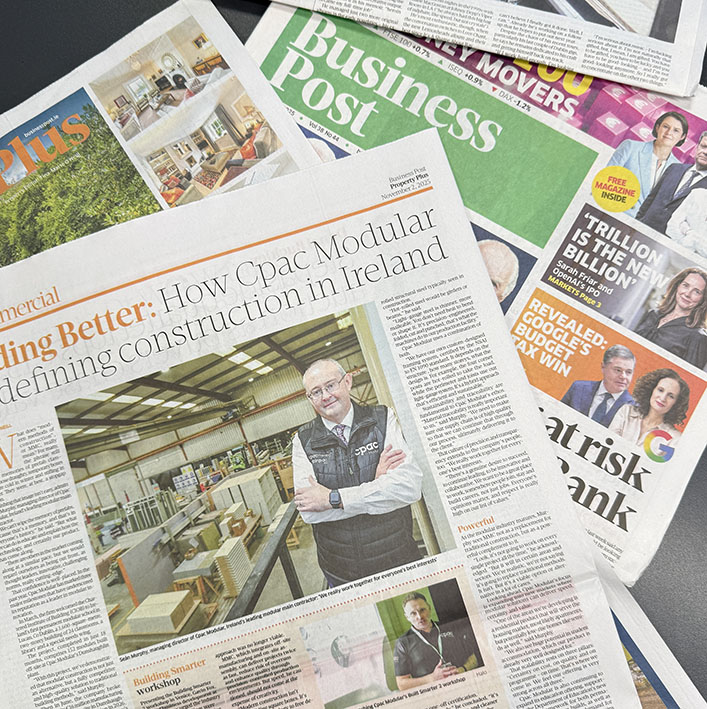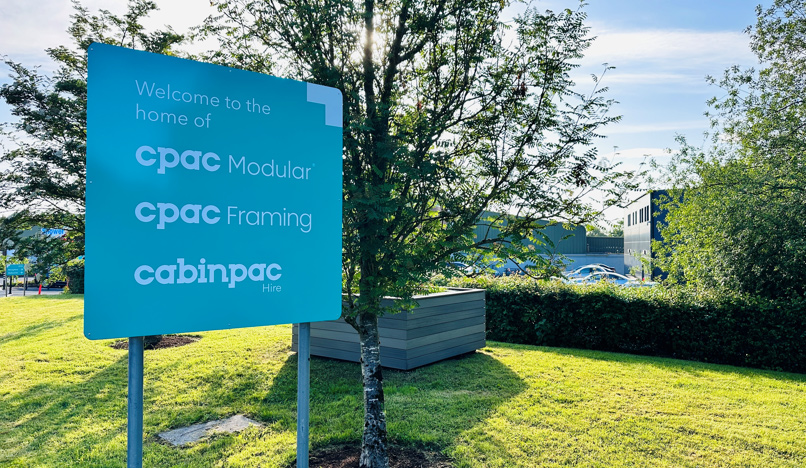Gomos residences, Cambra Valley, Portugal
Designed by Summary Architects, this project includes six 45 square metre residential units using exclusively prefabricated and modular construction systems.


Seán Murphy, managing director of Cpac Modular, Ireland’s leading modular main contractor: ‘We really work together for everyone’s best interest’s’
What does “modern methods of construction”, or MMC, really mean? For many, the phrase still conjures memories of prefab classrooms: those draughty, temporary boxes that were cold in winter and stifling in summer. They were, at best, a stopgap solution.
Banishing that image isn’t easy, admits Seán Murphy, managing director of Cpac Modular, Ireland’s leading modular main contractor.
“We can’t wipe the memory of prefabs, because that’s a memory, and that’s in everyone’s history,” he says. “But what we can do is educate and explain how the technology, and certainly our product, has come along.
“There are others in the market coming along at a similar pace, but we would regard ourselves as being out front, as thought leaders, innovative, challenging norms, really cutting-edge.”
That confidence is well-placed. In the past year, Cpac Modular has marked three major milestones that have underscored its reputation as a leader in modular innovation.
In March, the firm welcomed the Chartered Institute of Building (CIOB) to Ireland’s first permanent modular school in Lucan, Co Dublin, a 3,600-square-metre, two-storey building of 24 classrooms, a library and a special needs wing.
The project, completed in just 18 months, comprises 152 modules built off-site at Cpac Modular’s Dunshaughlin plant.
“With this project, we’ve demonstrated that modular construction is not just an alternative, but a fully competitive and high-quality solution to traditional building methods,” said Murphy.
Then in June, the company broke ground on its €16 million manufacturing facility on a 22-acre site in Dunshaughlin, Co Meath. Due for completion in 2026, the new HQ will triple the company’s production capacity and create 100 new jobs.
By August, the company had unveiled its next-generation modular student accommodation solution, capable of delivering a 300-bed complex in just 12 months. “This is more than just a building – it’s a bold step toward smarter, faster, more sustainable student accommodation,” said Murphy at the launch.
It’s been, he agrees, “a busy year.”
Most recently, Cpac Modular took its message to the global stage, launching Built Smarter 2: Designing the Future of Construction, an immersive workshop series for architects and designers.
The sequel to its award-winning Built Smarter programme, it was introduced in Venice during La Biennale di Venezia 2025, a fitting backdrop for a company that views architecture as both science and art.
A group of Irish architects joined the Cpac Modular team at the Biennale, where the workshop explored how MMC is reshaping not just how we build, but how we think about building. “In this latest version, we’re looking more at the design stage,” Murphy explained.
“The idea is to get MMC at the forefront of designers’ minds before the project gets too far down the line, where it’s too late to go back. We wanted to get in early, to make sure it’s pre-emptive.”
That educational approach is key to Cpac Modular’s mission. The company frequently opens its Meath production facility to visitors, including representatives from the Department of Housing.
“They were delighted to see MMC in operation,” said Murphy. “To actually witness how the process works, the quality controls, the traceability and sustainability elements, even the digitisation of our production flow. We have interactive screens that link directly back to drawings and to the ERP system, recording material usage and costs in real time.”
That ERP, or enterprise resource planning, system is a cornerstone of Cpac Modular’s growth, one Murphy himself helped to implement when he first joined the company. “I came in as CFO to prepare the business for growth,” he said.
“That involved implementing an ERP, developing processes and putting financial stability and a platform for growth in place, with a view to taking on the CEO role.”
Before that, Murphy spent two decades with construction giant CRH. “That’s where I cut my teeth,” he said, “in scaling businesses and driving into new markets.” That experience, combined with Cpac Modular’s in-house design, production, and engineering teams, has helped the company push modular boundaries.
Among its most transformative investments this year is nearly €1.5 million in custom-built light-gauge steel machines from New Zealand firm Howick.
“They allow us greater control of our programme and delivery,” Murphy said. “We can design our frames in the morning, send the files to the machines, and start rolling an hour later. We’ve taken weeks out of our timelines by bringing that capability in-house. We can react and respond faster – and maintain tighter control on quality.”
Light-gauge steel, he explains, differs from the hot-rolled structural steel typically seen in construction. “Hot-rolled steel would be girders or beams,” he said.
“Light-gauge steel is thinner, more malleable. You don’t need heat to bend or shape it. It’s precision-engineered, folded, cut and punched, that’s what the machines do in our production facility.”
Cpac Modular uses a combination of both.
“We have our own custom-designed framing system, certified by the NSAI to EN 1090 standard,” Murphy continues.
“It depends on the structure , how many storeys, what the design is. For example, the four corner posts are hot-rolled to take the load, while the perimeter and joists use our light-gauge system. It’s a hybrid approach that’s efficient and sustainable.”
Sustainability and traceability, he emphasises, are fundamental to Cpac Modular’s ethos. “Material traceability is really important to us,” said Murphy. “We need to make sure our supply chain is of high quality so that we can continue that through our process, ultimately delivering it to the client.”
That culture of precision and transparency extends to the company’s people, too. “We really work together for everyone’s best interests,” he said.
“There’s a genuine desire to succeed, to continue leading, to be innovative and collaborative. We want to be a great place to work, somewhere people join, stay, and build careers, not just jobs. Everyone’s opinions matter, and respect is really high on our list of values.”
As the modular industry matures, Murphy sees MMC not as a replacement for traditional construction, but as a powerful complement to it.
“Look, it’s not going to work on every single project all the time,” he acknowledged.
“But it will in certain areas and sectors. We’re realistic, we’re not saying it’s going to replace traditional methods. It isn’t. But it’s a viable option or alternative in a lot of cases.”
Looking ahead, Cpac Modular’s focus is expanding into new markets where modular solutions can deliver speed, certainty, and value.
“One of the areas we’re developing is a residential product that will serve the housing market, most likely apartments, but potentially low-rise homes like semi-ds as well,” said Murphy.
“We also see huge potential in student accommodation, which our product is already very well designed for.”
That scalability, he explained, rests on three pillars: “Certainty on cost, on quality, and on programme – on time. That’s where we come in. We feel our offering is very strong across all three.”
Cpac Modular is also continuing to expand its education offering, supporting the Department of Education’s new modular framework for both permanent and short-term builds, as well as in healthcare, where the demand for bed spaces and clinical facilities remains high.
“Nursing homes and hospital extensions are particularly suited to our product,” Murphy said.
“Because our on-site impact is low, we can build in live environments such as schools, hospitals, care facilities, without major disruption to residents or operations.”
From Lucan’s landmark modular school to Venice’s architectural stage, and now to a pipeline of homes, hospitals and higher education projects, Cpac Modular is proving that the “prefab” of the past has evolved into a precision-engineered solution for the future, one that’s permanent, sustainable and proudly Irish.
Presenting the Building Smarter 2 workshop in Venice, Gavin Fox, head of Business Development at Cpac Modular, urged the industry to rethink how buildings are designed and delivered, drawing a parallel between today’s shift toward modern methods of construction (MMC) and the early mass adoption of the motor car.
“The current construction model is broken,” Fox said, noting that MMC can address today’s key sectoral pressures: labour shortages, sustainability targets, and housing demand.

With around 40 per cent fewer people working in the Irish construction sector than before the 2007 crash, and with the state aiming to deliver 300,000 homes by 2030, he said the traditional approach is no longer viable.
MMC, which integrates off-site manufacturing and on-site assembly, can deliver projects twice as fast, reduce risk of overruns, and enhance quality through precision-controlled production environments.
But speed, he cautioned, should not come at the expense of creativity. “Modern construction isn’t about building square boxes,” Fox said. “It’s about using technology to free design rather than restrict it.”
Sustainability is also central to the model. Building off-site reduces waste, transport emissions, and on-site disturbance, while materials such as light gauge steel offer infinite recyclability without loss of integrity.
Fox also emphasised the importance of life cycle analysis in assessing true sustainability. Through digital twin technology, Cpac Modular can monitor how a building performs over time, tracking energy use, air quality, and water systems to meet emerging international benchmarks such as the RESET standard, which measures ongoing environmental performance rather than one-off certification.
“Ultimately,” he concluded, “it’s about smarter, faster, and cleaner building, and ensuring that the innovation we create continues to deliver value throughout a building’s lifetime.”

Enclave: Croydon, East Croydon, UK
Europe’s tallest modular residential tower at 163 metres. Built off-site and assembled on-site in just 28 months.

The Bowery Hotel, New York, USA
A 21-storey, 300-room modular hotel delivered 50% faster than traditional methods.

Sindalah Island Hotel, Saudi Arabia
By Dubai-based Neom Group — 800+ prefabricated modules forming 218 serviced apartments with minimal environmental impact on this pristine island.

Lucan East Educate Together National School, Co Dublin, Ireland
Ireland’s first permanent modular school: 3,600 sq m over two storeys, delivered early and on budget.

143 Merrion Road, Dublin 4, Ireland
Lioncor’s cutting-edge private scheme of 63 apartments combines modern MMC design with high-performance materials — aluminium standing seam roof, triple-glazed windows, and energy-efficient façades.

Gomos residences, Cambra Valley, Portugal
Designed by Summary Architects, this project includes six 45 square metre residential units using exclusively prefabricated and modular construction systems.
Our expert team can advise you on the best solution for your next building project
